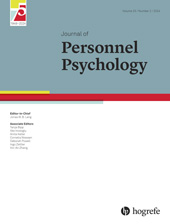Abstract
Zusammenfassung. In der vorliegenden Studie wurde das Assessment Center für angehende Berufsoffiziere der Schweizer Armee anhand von drei Kriterien evaluiert: Studienerfolg, Leistungsbeurteilung durch den direkten Vorgesetzten sowie Status (Zugehörigkeit zum Generalstab). Dieses Instrument stellt seit 1996 die Hauptvoraussetzung dar, um zum Studium als Berufsoffizier an der Militärakademie (vormals Militärische Führungsschule) an der ETH Zürich zugelassen zu werden. Speziell ist, dass dieses AC in den ersten drei Jahren (1993-1995) nur zur Potentialbeurteilung, nicht aber zur Selektion eingesetzt wurde. Von den Kandidaten aus diesen drei Jahren liegen nun in einem zeitlichen Abstand von sechs bis acht Jahren Leistungsbeurteilungen aus dem beruflichen Alltag sowie Angaben zum Status vor. Es zeigt sich, dass das AC gegenüber den Schulnoten sowohl bezogen auf die Studienleistung wie auch auf die beiden Berufserfolgskriterien inkrementelle Validität aufweist. Allerdings erweist sich die Abschlussnote des Studiums als besserer Prädiktor hinsichtlich des Status.
Abstract. The present study evaluated the assessment center for the career officer selection in the Swiss Armed Forces applying three external criteria: a) study success, b) performance appraisal as carried out by the immediate superior, and c) status (defined as belonging to the general staff). The successful completion of this assessment center has been a major entry requirement for officers who want to study at the Military Academy at the Swiss Federal Institute of Technology Zurich since 1996. In its first years (1993-1995), however, the AC was only a means of potential appraisal. Thus, success or failure in the AC had no influence on whether or not the officer was admitted to the study course. Performance appraisals of those candidates who underwent the AC in the period of 1993-1995 have been made available six to eight years later. In addition to the AC results, overall appraisal school grades were also taken into consideration as predictors. The findings show that the AC has - over and above school grades - incremental validity regarding study performance as well as the two professional criteria. The final grade the student gets from the study course, however, is the better predictor regarding status.
Literatur
(2004). Die Prognose des Berufserfolgs von Hochschulabsolventinnen und -absolventen. Zeitschrift für Arbeits- und Organisationspsychologie , 48 , 4– 16
(2003). ACABO - Das Assessment Center für angehende Berufsoffiziere in der Schweizer Armee. In S. Höft & B. Wolf (Hrsg.), Qualitätsstandards für Personalentwicklung in Wirtschaft und Verwaltung (S. 54-71). Hamburg: Windmühle
(1996). Standards der Assessment-Center-Technik. In Arbeitskreis Assessment Center e.V. (Hrsg.), Assessment Center als Instrument der Personalentwicklung (S. 485-493). Hamburg: Windmühle
(1989). Prognostische Validität von Schulabschlussnoten. Eine Metaanalyse der Prognose des Studien- und Ausbildungserfolgs. In R. S. Jäger, R. Horn & K. Ingenkamp (Hrsg.), Tests und Trends 7 (S. 11-39). Weinheim: Beltz
(1998). Personnel selection: Adding value through people . (3rd ed.). Chichester: Wiley
(1989). The validation of the selection of male British Army officers. Journal of Occupational Psychology , 62 , 313– 325
(1988). Validity of a police assessment center: A 1-19 year follow-up. Journal of Occupational Psychology , 61 , 129– 144
(1996). Assessing the non-random sampling effects of subject attrition in longitudinal research. Journal of Management , 22 , 627– 652
(1998). The role of cognitive ability in the subgroup differences and incremental validity of assessment center exercises. Personnel Psychology , 51 , 357– 374
(2005). The influence of social and cognitive skills in choosing professional military officers. In E. R. Micewski & H. Annen (Eds.), Military ethics in professional military education - Revisited 9 (pp. 60-64). Frankfurt am Main: Lang
(2004). Zwei Seiten derselben Medaille? Empirische Überlappungen zwischen Persönlichkeitseigenschaften und Assessment Center-Anforderungsdimensionen. Zeitschrift für Personalpsychologie , 3 , 6– 23
(2002). Statistical methods for psychology (5th. ed.) . Pacific Grove, CA: Wadsworth Group
(1984). Validity and utility of alternative predictors of job performance. Psychological Bulletin , 96 , 72– 98
(2000). Guidelines and ethical considerations for assessment center operations. Public Personnel Management , 29 , 315– 331
(2003). Assessment Center . Göttingen: Hogrefe
(1997). Assessment Center. Stand der Forschung - Konsequenzen für die Praxis . Göttingen: Hogrefe
(1987). Why do assessment centers work? The puzzle of assessment center validity. Personnel Psychology , 40 , 243– 260
(1999). The moderating effects of raters’ opportunities to observe ratees’ job performance on the validity of an assessment center. International Journal of Selection and Assessment , 7 , 133– 141
(1982). Validity and fairness of some alternative employee selection procedures. Personnel Psychology , 35 , 1– 62
(1982). Constructs and assessment center dimensions: Some troubling empirical findings. Journal of Applied Psychology , 67 , 401– 410
(Hrsg.) (1995). Management-Diagnostik . (2. Aufl.). Göttingen: Hogrefe
(1993). Das nomologische Netzwerk des Assessment Centers: Eine Metaanalyse. Zeitschrift für Arbeits- und Organisationspsychologie , 37 , 73– 85
(1998). The validity and utility of selection methods in personnel psychology. Practical and theoretical implications of 85 years of research findings. Psychological Bulletin , 124 , 262– 274
(1993). Intelligenz und Ausbildungserfolg: Eine Untersuchung zur prognostischen Validität des I-S-T 70. Zeitschrift für Arbeits- und Organisationspsychologie , 37 , 52– 63
(2000). Psychologische Personalauswahl. Einführung in die Berufseignungsdiagnostik . (3. Aufl.). Göttingen: Hogrefe
(1989). Berufseignungsdiagnostik. In E. Roth (Hrsg.), Organisationspsychologie. Enzyklopädie der Psychologie D/III/3 (S. 281-320). Göttingen: Hogrefe
(2004). Leistungsbeurteilung. In H. Schuler (Hrsg.), Organisationspsychologie - Grundlagen und Personalpsychologie. Enzyklopädie der Psychologie (D/III/3) (S. 947-1006). Göttingen: Hogrefe
(1982). Assessment centers and managerial performance . London: Academic Press
(1992). Die prädiktive Validität des Assessment Centers - eine Metaanalyse. In H. Schuler & W. Stehle (Hrsg.), Assessment Center als Methode der Personalentwicklung (2. Aufl., S. 36-60). Göttingen: Hogrefe
(1993). Predictive validity of cognitive and noncognitive variables with respect to choice of occupation and job success: Individual and organizational perspectives. In H. Schuler, J. Farr & M. Smith (Eds.), Personnel selection and assessment (pp. 303-314). Hillsdale: Erlbaum
(1996). Longitudinal studies in organizational stress research: A review of the literature with reference to methodological issues. Journal of Occupational Health Psychology , 1 , 145– 169



